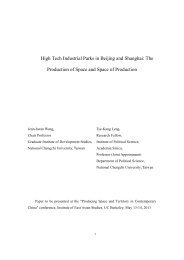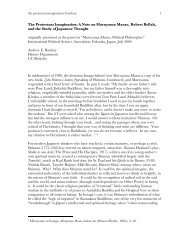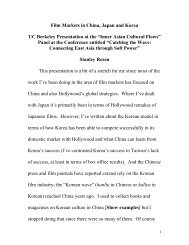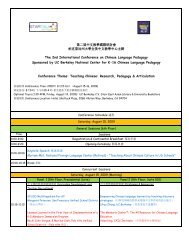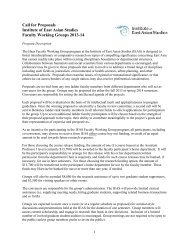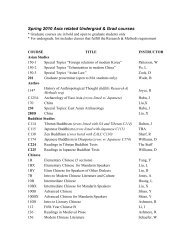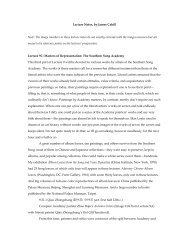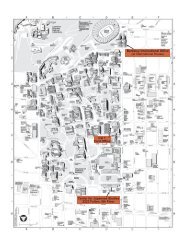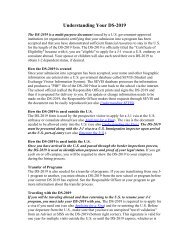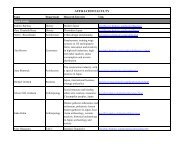Third Edition Spring 2013 - Institute of East Asian Studies, UC ...
Third Edition Spring 2013 - Institute of East Asian Studies, UC ...
Third Edition Spring 2013 - Institute of East Asian Studies, UC ...
Create successful ePaper yourself
Turn your PDF publications into a flip-book with our unique Google optimized e-Paper software.
How Does Ethnicity Affect CurrentChina-Malaysia Relations?Kankan XieAbstractThis paper aims to analyze the current China-Malaysia bilateral relationshipfrom the perspective <strong>of</strong> ethnicity by drawing attention to Malaysia’sethnic-based domestic politics. Unlike in many other countries where Chinesediasporic communities account for only a relatively small portion <strong>of</strong> the totalpopulation, the proportion <strong>of</strong> ethnic Chinese in Malaysia represents a sizableminority <strong>of</strong> 24.6%. In order to take care <strong>of</strong> Chinese interests domestically whilereducing the country’s dependence on its ethnic Chinese minority in dealing withChina-related issues, the Malay-controlled Malaysian government has activelyadopted a series <strong>of</strong> implicitly pro-China policies in both bilateral and multilateralspheres. This paper first examines how the Chinese diaspora fits within theMalaysian domestic political climate in general. Based on a survey conducted in2009, this paper discusses how Malaysian people’s perceptions <strong>of</strong> China vary accordingto their ethnic background. Following this, it demonstrates the ways inwhich economic and cultural issues affect China-Malaysia relations as the country’sdomestic political struggles proceed. This study concludes that there is amismatch between Malaysian Chinese’s relatively high economic status and theirsubordinate role in Malaysia’s patronage system. On the one hand, this allowsthem to benefit tremendously from close China-Malaysia bilateral ties and thusgain substantial leverage in domestic politics, but on the other, makes them furthermarginalized in inter-governmental dialogues.Since the establishment <strong>of</strong> diplomatic relations in 1974, thebilateral relationship between China and Malaysia has been developingsmoothly and steadily. The friendly ties between the twocountries have become increasingly close over the subsequent 38years. According to data published by China’s Ministry <strong>of</strong> ForeignAffairs in 2011, bilateral trade rose by 42.8% and its total amountreached $74.2 billion USD in 2010, which was the highest amongall ASEAN countries. China’s imports from Malaysia reached $50.4billion USD and its exports to Malaysia totaled $23.8 billion, an increase<strong>of</strong> 55.9% and 21.3% respectively compared to the 2009 data.As <strong>of</strong> the same year, Malaysia had directly invested $5.6 billion USDin China. By comparison, China’s direct investment in Malaysia was$440 million. Driven by this vibrant economic cooperation, bilateralexchanges <strong>of</strong> people are also more frequent than before. Morethan one million people from each country visited the other in2010. 1 For Malaysia, China has become a major source <strong>of</strong> tourists.The two countries have signed a number <strong>of</strong> agreements aimed atdeepening bilateral cooperation in various fields, including technology,culture, education and military. Despite minor issues, suchas a territorial dispute over the Spratly Islands in the South ChinaSea, the development <strong>of</strong> the China-Malaysia relationship is generallyquite positive, and is expected to continue improving into theforeseeable future.Among many important factors contributing to the stabledevelopment <strong>of</strong> bilateral ties, the ethnic composition <strong>of</strong> Malaysiansociety is one that influences their bilateral engagement in manyareas. According to the 2010 census, 24.6% <strong>of</strong> Malaysia’s total populationis Chinese. 2 Unlike in many other countries where Chinesediasporic communities account for only a relatively small proportion<strong>of</strong> the total population (Singapore is the only exception), thepercentage <strong>of</strong> ethnic Chinese in Malaysia is high and represents asizable minority.Politically, Beijing does not openly support the political organizations<strong>of</strong> Malaysian Chinese outside <strong>of</strong> the ruling United Ma-1 Kankan XieIntroduction1 Ministry <strong>of</strong> Foreign Affairs <strong>of</strong> the PRC, Zhongguo Tong Malaixiya De Guanxi(China-Malaysia Relations), updated on 8/9/2011, http://www.fmprc.gov.cn/chn/gxh/cgb/zcgmzysx/yz/1206_20/1206x1/t5702.htm (accessed 11/5/2012)2 Department <strong>of</strong> Statistics, Malaysia, Population and Housing Census, Malaysia2010, http://www.statistics.gov.my/portal/index.php?option=com_content&view=article&id=1215&Itemid=89&lang=en,(accessed 10/26/2012)Ethnicity And China-Malaysia Relations 2



